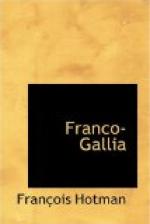Of all these Matters, we shall give only a few Proofs, out of many which we could produce. First, out of Eginarthus, who was Chancellor to Charles the Great, and wrote his Life. These are his Words: “Wherever he went (speaking of Charlemagn) about the publick Affairs: he was drawn in a Waggon by a Pair of Oxen, which an ordinary Waggoner drove after his rustical Manner. Thus he went to the Courts of Justice, thus to the Place of the Publick Convention of his People, which every Year was celebrated for the Good of the Realm; and thus he used to return Home again.”
Joannes Nauclerus gives us an Account of the very same Thing, in almost the same Words, in Chron. Generat. 26. So does the Author of the Great Chronicle, in the Beginning of his Life of Charlemagn, Fol. 77. Neither ought this to seem so great a Wonder to any, who considers it was the Fashion in those Days for our Kings and Queens, and the Royal Family, to be drawn by Oxen; of which we have one Instance in Greg. Turon. lib. 3. cap. 26. “Deuteria, (says he) Wife of King Childebert, seeing her Daughter by a former Husband grown to Woman’s Estate, and fearing lest the King (being in Love with her) should lye with her, caused her to be put into a Sort of Litter with untamed Oxen, and thrown Headlong off a Bridge.” Aimoinus, lib. 4. cap. 30. makes mention of the Golden Throne, where he speaks of King Dagobert: “He proclaimed, says he, Generale PLACITUM in loco nuncupato Bigargio, a Great Council in a Place named Bigargium: To which all the Great Men of France assembling with great Diligence on the Kalends of May, the King thus began his Speech to them, sitting on his Golden Throne.” Also in his 41st Chapter, speaking of King Clodoveus—Sitting in the midst of them, on his Golden Throne, he spoke in this Manner, &c. Sigebertus in Chron. Anni 662.—“’Tis the Ancient Custom (says he) of the Kings of the Franks, every Kalends of May, to preside in a Convention of all the People, to salute and be saluted, to receive Homage, and give and take Presents.” Georgius Cedrenus expresses this in almost the same Words: [Greek: katta de ton Maion mena prokaithesesai epi pantos tou ethnous kai proskunin autois kai antiproskunisthai hup auto dorophoreisthai te katta sunepheian kai antididonai autois]
Now, concerning the Authority of the People, who were thus gather’d together at the Great Council, we have many Testimonies, Aimoinus, lib. 4. cap. 41. speaking of Clodoveus the Second; “Altho’ (says that King in his Speech) the Care of our Earthly Principality obliges us to call you together Francigenae cives, and to consult you in Affairs relating to the Publick, &c.”—Also in his 74th Chapter of the same Book—“In the Beginning of the




